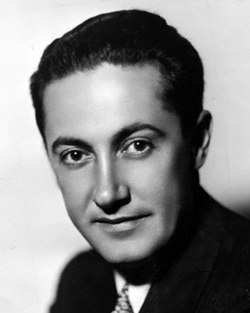- The Broadway Melody is the second film to win the Academy Award for Best Picture, which was at the time known as Outstanding Picture. [10]
- The full film of The Broadway Melody
- The full film of The Hollywood Revue of 1929
- The full film of White Shadows in the South Seas , which won for Best Cinematography
| 2nd Academy Awards | |
|---|---|
 Presenter William C. deMille (holding statuette) with Oscar winners Hanns Kräly, Mary Pickford, and Warner Baxter (left to right). | |
| Date | April 3, 1930 |
| Site | Ambassador Hotel, Los Angeles, California |
| Hosted by | William C. deMille |
| Highlights | |
| Best Picture | The Broadway Melody |
| Most awards | Seven films each received one award. [A] |
| Most nominations | In Old Arizona and The Patriot (5) |
The 2nd Academy Awards, presented by the Academy of Motion Picture Arts and Sciences (AMPAS) on April 3, 1930, at an awards banquet in the Cocoanut Grove of the Ambassador Hotel in Los Angeles, honored the best films released between August 1, 1928, and July 31, 1929. [2] This was the first Academy Awards ceremony broadcast on radio, by local station KNX, Los Angeles. [3] [4] [5] Over 300 attended the event, which included Academy members and guests. [2]
Contents
- Winners and nominees
- Awards
- Multiple nominations and awards
- Changes to Academy Awards
- Gallery
- See also
- References
- External links
The second ceremony included a number of changes from the first: most importantly, it was the first presentation for which the winners were not announced in advance, and the number of award categories was reduced from twelve to seven. It is unique in that there were never any official nominees; instead, AMPAS conducted further research and came up with a list of unofficial or de facto nominees using records of the films that the judges had given their opinions on. Chester Morris was the first nominee for Best Actor born in the 20th century.
Mary Pickford, a founding member of AMPAS and married to its first president, [4] lobbied to be considered for the Best Actress award, inviting the judges over for tea at her home, [6] while other actresses being considered for the same award were not made aware of their status. [7]
Jeanne Eagels became the first and, to date, only actress to be posthumously nominated for Best Actress, for The Letter . [8] The Divine Lady became the last film to win Best Director without receiving a Best Picture nomination.
This is the only year in which no film won more than one Oscar. The Broadway Melody became the second of seven films to win Best Picture without a writing nomination (preceded by Wings , and followed by Grand Hotel , Cavalcade , Hamlet , The Sound of Music , and Titanic ), and the first of three to win Best Picture and nothing else (followed by Grand Hotel and Mutiny on the Bounty ).







